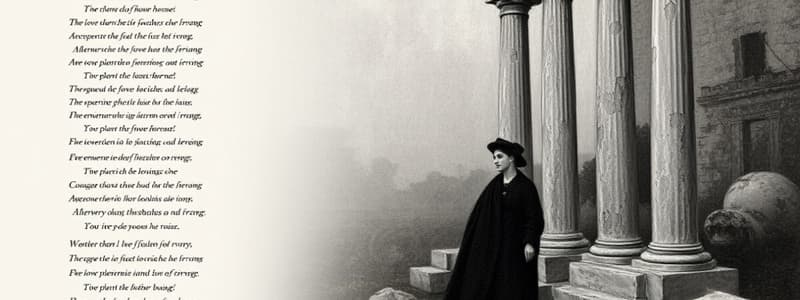Podcast
Questions and Answers
What does the speaker primarily contemplate throughout the poem?
What does the speaker primarily contemplate throughout the poem?
- The significance of time
- The contrast between the city and pastoral life (correct)
- The history of the empire
- The power of the king
The poem 'Love Among the Ruins' was published in 1855.
The poem 'Love Among the Ruins' was published in 1855.
True (A)
What does the speaker's anticipated meeting with his beloved symbolize?
What does the speaker's anticipated meeting with his beloved symbolize?
Simplicity and love
The poem contrasts the _____ of empire with the simplicity of love.
The poem contrasts the _____ of empire with the simplicity of love.
Which theme does the poem reflect?
Which theme does the poem reflect?
What does the rhyme scheme of the poem evoke?
What does the rhyme scheme of the poem evoke?
Match the elements of the poem with their descriptions:
Match the elements of the poem with their descriptions:
Flashcards are hidden until you start studying
Study Notes
Overview of "Love Among the Ruins"
- Written by Robert Browning and published in 1855 in the collection Men and Women.
- The poem contrasts a once-thriving city, representative of imperial power, with a serene pastoral landscape.
- The speaker's journey intertwines themes of love, nostalgia, and the passage of time.
Setting and Imagery
- Opens with a picturesque description of sheep returning home in the evening.
- Describes the ruins of a great city that was once the capital, filled with vibrant life now reduced to desolation.
- The only remnant of the city is a "single turret," symbolizing the remnants of its greatness.
Themes
- Central theme: the opposition between complicated, vibrant life and the peaceful simplicity of love.
- The speaker's love interest is waiting in the turret, which represents hope and personal connection amidst historical ruin.
- The poem raises questions about the value of past grandeur versus present love.
Characterization
- Strong contrast between the speaker's romantic anticipation and the grandeur of the now-ruined city.
- The king, representing the power of the past, is mentioned but lacks personal depth, highlighting the emptiness of imperialism.
- The beloved, characterized by her silence, represents the simplicity and depth of personal love.
Poetic Techniques
- Utilizes dramatic irony: the speaker is more captivated by the city's history than by his current love, challenging expectations in love poetry.
- Emphasizes an anti-imperialist message contrasting the excitement of empire with the fulfillment found in love.
- The poem unfolds through a complex rhyme scheme that juxtaposes longer, energetic lines with short, reflective ones.
Psychological Movement
- A mental journey from the excitement of a fallen empire to the simplicity of enduring love.
- Highlights the tension between memory and present experience, revealing the speaker's internal conflict.
- The speaker must consciously choose to prioritize love over the allure of the city's past grandeur.
Conclusion
- The declaration that "Love is best" is not a foregone conclusion but a conscious choice made amidst temptation by the past.
- Browning's intricate style invites readers to consider the richness of simple love against the backdrop of historical complexity.
Studying That Suits You
Use AI to generate personalized quizzes and flashcards to suit your learning preferences.




